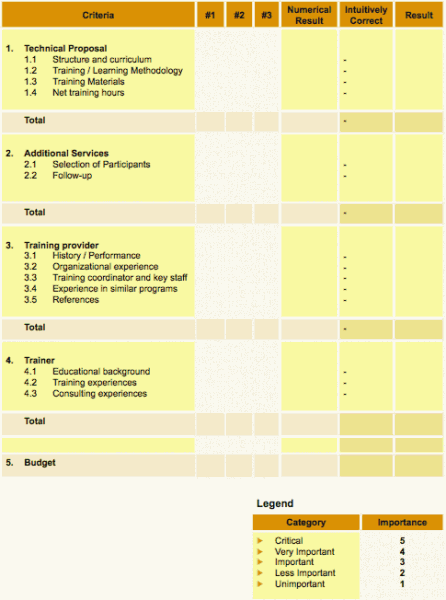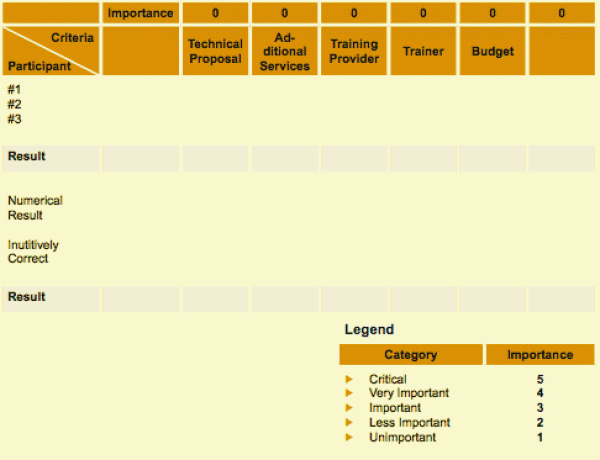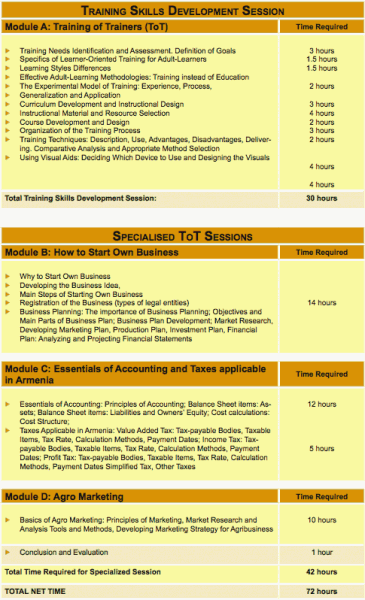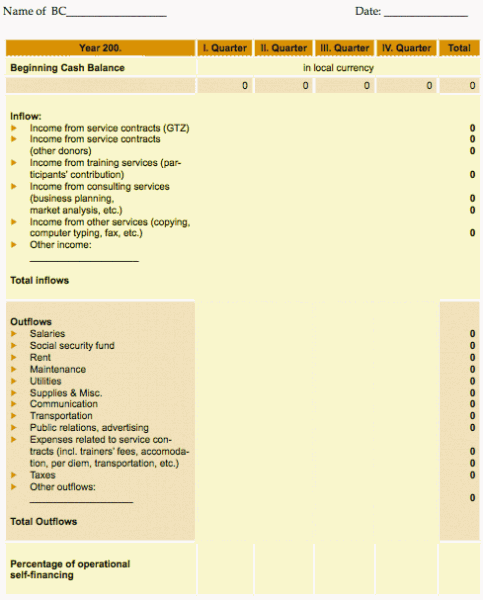The participants should:
- have proper background, preferably in economics, finance or accounting;
- possess a demonstrated commitment to learning
- be willing to share their knowledge and skills;
- be able to communicate with people effectively;
- possess good facilitation and presentation skills.
H. Draft terms of reference for business development training and identify possible training providers. The terms of reference should include the following tasksPreparation and delivery of training techniques and methodologies;Preparation and delivery of learning materials. The training topics are based on a needs assessment and may include business plan writing, essentials of accounting, essentials of bookkeeping and taxes, and marketing;Hands-on instruction and guidance on developing training materials focused on needed/demanded topics;Evaluation and assessment of the trainees capabilities as trainers;Coaching selected trainers in their first training course.
Communicate the Training of Trainers (ToT) to short-listed training providers and request a technical and cost proposal.
I. Select the training provider(s) to carry out the ToT. Training providers should be selected according to established criteria reflected in the training contract. A potential approach to select training providers is set forth in Tables 1 and 2.
Table 1: Matrix for Prioritizing Issues

Table 2: Training Provider

J. Prepare training materials, manuals and handbooks. The contracted training providers should be advised concerning the design and preparation of the training modules. Each training module should be discussed with the training providers and approved before carrying out the ToT. A brief description of the ToT, including the topics to be covered, is provided in table 3.
K. Conduct the Training of Trainers (ToT). The training is conducted according to the technical proposal. During the course of the ToT, trainees develop basic training modules for the training of entrepreneurs to be undertaken at the next stage.
L. Monitor and evaluate the training services performed. Project personnel should monitor the quantity and quality of training services performed. An evaluation by the trainees should be conducted after each training module.
M. Select potential trainers for BCs. The most promising candidates (generally, 2-3 trainers per region) are selected to conduct their first training courses on their own. Selection of the most promising candidates is based on participants’ performance and activeness during the ToT sessions, which are evaluated by experts from the training institution.
N. Facilitate and support follow-up business development training for entrepreneurs based on the training modules developed within the ToT framework. ToT participants selected to conduct training courses on their own should be supported by the ToT training provider as outlined below:
- Coaching the most qualified selected trainers in their first training course;
- Delivering hands-on instructions and guidance to these local trainers in developing suitable training materials;
- Evaluating and providing feedback to improve their training;
- Providing consultancy support throughout the follow-up period;
- Organizing concluding workshop so that participants may share training experience and discuss further cooperation perspectives.
O. Select local trainers for BCs. The top two trainers from each region should be selected as local trainers within the structure of the BC. Other qualified trainers should be used as resource persons according to specialization on a freelance basis.
P. Provide advice and support to BCs staff on the development of the Centre’s strategy paper, which will define the role the BC seeks to play in SME development and the scope of services offered by the BC. Typical services could include:
- preparation of business plans and investment proposals;
- market research and analysis;
- advice on legal and tax issues;
- accounting and bookkeeping;
- preparation of legal documentation for the registration of enterprises;
- provision of information about existing and reachable sources of financing, modern production technologies and machineries; and
- locating potential business partners.
Q. Monitor and evaluate BCs development. The project should continually monitor the sustainability of the BCs. Table 4 provides an example of how a monitoring system could look like. At the completion of the budget period, an external party produces a final report on the development of the BCs and evaluates whether the services provided the intended direct and indirect benefits to the target groups.
Table 3: Training Skills Development Session

|





